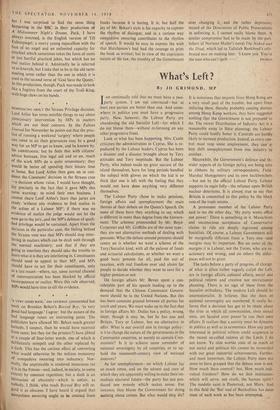R EMINISCING ABOUT the Strauss Privilege decision, Lord Attlee has some
sensible things to say about unnecessary intervention by MPs in matters which are not their concern. In the Fabian Journal for November he points out that the prac- tice of running a weekend 'surgery' where people can come to air their grievances may be a good way for an MP to get to know, and be known by, his constituents; but, he feels that with citizens' advice bureaux, free legal aid and so on, much of the work MPs do is quite unnecessary; they would be better off spending their leisure time at home. But Lord Attlee then goes on to con- demn the Commons' decision in the Strauss case —a decision whose value, I would have thought, lay precisely in the fact that it gave MPs this same warning: to mind their own business. 1 cannot share Lord Attlee's fears that juries are ready 'without any evidence to find malice in the action of a Labour MP'; if there was no evidence of malice the judge would not let the case go to the jury, and the MP's defence of quali- fied privilege would be sustained. Apart from the decision in the particular case, the feeling behind the Strauss vote was that MPs should stop inter- fering in matters which can be dealt with through the normal machinery; and that if they are going to interfere they should take the trouble to learn what it is they are interfering in. Constituents should need to appeal to their MP, and MPs should have to act for their constituents, only as a last resort—where, say, some normal channel of communication has been blocked by official incompetence or malice. Were this rule observed, MPs would haVe time to sift the evidence.
* * *






































 Previous page
Previous page